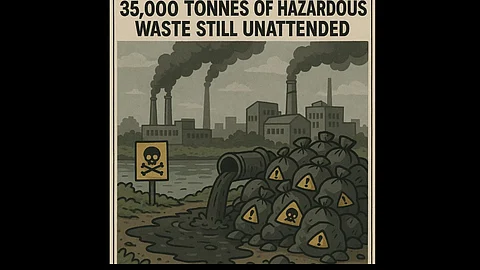

A recent report by the Goa State Pollution Control Board (GSPCB) has highlighted several environmental initiatives undertaken at the Cuncolim Industrial Estate under national pollution control programmes. However, local residents remain unconvinced, citing ongoing issues such as foul odour, air and water pollution, and the long-standing presence of hazardous waste.
According to the GSPCB, measures have been implemented under the National Air Monitoring Programme (NAMP) and the National Water Monitoring Programme (NWMP), including Ambient Air Quality Monitoring and Water Quality Monitoring. Additionally, the Board has conducted environmental audits of fish meal and fish processing units and directed all industrial units to ensure Stack Emission Monitoring, Effluent Treatment Plant (ETP) Monitoring, Ambient Air Monitoring, and proper slag disposal.
Despite these steps, residents of Cuncolim – who have been actively campaigning against pollution in the area – argue that little has changed on the ground. The persistent stench from industrial units, coupled with recurring air and water contamination, continues to disrupt daily life.
One of the most pressing concerns is the unresolved disposal of approximately 35,000 tonnes of hazardous zinc waste, lying at the estate for nearly two decades. Locals have repeatedly urged the government and its agencies – including the Department of Science, Technology and Waste Management – to take immediate and effective action.
A glimmer of hope has emerged with Chief Minister Pramod Sawant recently announcing in the Goa Legislative Assembly that Levinson Martins is set to be appointed as the new Chairman of the GSPCB. Martins, a native of Assolna and former Member Secretary of the Board, is seen as someone familiar with Cuncolim’s environmental challenges.
While the announcement has raised hopes for stronger local accountability, residents remain cautiously optimistic. Many argue that leadership changes alone will not suffice unless accompanied by a systemic overhaul and strict enforcement of environmental norms.
As Cuncolim waits for tangible improvement, environmental activists are urging authorities to move beyond paperwork and deliver on long-promised clean-up and regulatory action.